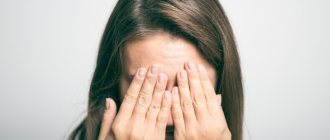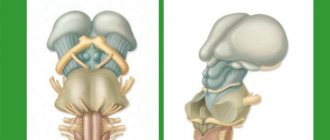Medical information is reliable Checked by Shaidullin Renat Flyurovich
Depression is a disease of our time, as the disorder is called at the everyday level. Every day the number of recorded cases is growing; according to statistics, about 20% of the population of countries with a good standard of living suffers from it. The disease is serious; when the first signs appear, you should contact a specialist. Treatment of depression will help you return to normal life, get rid of apathy and bad mood, and increase your ability to work.
The difficulty of therapy is that patients are very little aware of the causes of the disorder and its consequences. Prolonged mental and physical illness is often mistaken for bad character, whims, and constant dissatisfaction, so they do not pay attention to it. The condition does not go away on its own; you need the help of a specialist. At Dr. Isaev’s Clinic, the patient is not only prescribed a therapeutic course, but also relapse prevention is carried out, information is provided about the preconditions for the disorder and ways to avoid them.
Signs of Depression
Under certain circumstances, this condition can occur in every person, regardless of gender, age and social status. Depression is a type of mental illness accompanied by a persistent decrease in mood. A person remains in this state for more than two weeks continuously; he experiences a decrease in memory and concentration, loss of interest in life, and retardation of movements. In the absence of timely treatment, the patient loses the ability to live and work fully for many months and even years, and the possibility of attempting to commit suicide cannot be ruled out.
Reactive depression
Another severe form of manifestation is reactive depression. This is an acute psychotic disorder against the backdrop of a severely traumatic situation. A person is so shocked by the events that have happened that he literally disconnects from the world and withdraws into himself. Outwardly, he may look either extremely excited, or completely in control, reasonable and even cheerful. But this is only apparent calm. At any moment such a person can break loose and cause trouble. Therefore, in difficult life circumstances, it is better not to leave the patient, especially if his behavior has changed to the opposite. You need to talk to him in a calm tone and give him a herbal sedative. Along with acute depressive symptoms, with this disorder, symptoms of psychosis are also observed: psychomotor agitation, fears, and possibly delusional-hallucinatory symptoms.
Depression causes
According to statistics, about 90% of diagnoses are made to people who are in a state of chronic stress or experiencing acute psychological trauma. The body cannot cope with this influence of external factors on its own, the psyche fails, depressive episodes are a kind of defensive reaction.
Conditions arising due to severe psychological trauma are considered reactive. They can be triggered by the following events in the patient’s life:
- disability due to health and absence of serious illnesses;
- detection of a malignant tumor;
- conflicts at work, constant tension in relationships with colleagues;
- serious illness of a close relative;
- death of a loved one;
- divorce from your beloved spouse;
- retirement;
- rapid decline in financial levels;
- moving to another city and other factors that can be a real shock for a person.
Depression is not always formed on the basis of negative events. Sometimes the disease occurs when an important life goal is achieved, when a person experiences great success. The patient gets what he wanted. He suddenly loses the meaning of life, he no longer needs to make every effort for a specific result. The situation is aggravated if there are no other life goals at this moment.
A separate category includes depressive neurosis, which develops against a background of constant stress. In this case, it is not always possible to establish the specific cause that became the trigger for the pathology. The patient describes his life as a chain of constantly recurring failures that haunt him every day.
A depressive state of the psychogenic type is more typical for women, while older people suffer from the disease more often than young people. In our society, there are two extreme poles of financial well-being - poverty and wealth. This social scale causes a person to feel dissatisfied with himself if he constantly approaches the first category.
Additional provoking factors will be:
- pessimistic outlook on life;
- low self-esteem, constant self-flagellation;
- loss of parents, loved ones, friends;
- emotional violence against a person;
- physical aggression that the child experienced at an early age;
- predisposition to drug addiction and alcoholism;
- lack of support from others, their indifference towards the person.
Each of these factors in itself is not dangerous; if desired, a person can easily ignore it or seek help from a psychotherapist. If there are several of them, the situation becomes more complicated, the experiences become more intense and acute. In this case, drug treatment may be required.
For example, in a teenager, the period of growing up is associated with intensive growth of all organs and systems; pregnancy and menopause in women are accompanied by hormonal storms. This is fertile ground for the development of a melancholic mood and ever-increasing dissatisfaction with oneself. During these periods, experiences take on a negative connotation; the world around often seems hostile and indifferent.
Organic brain lesions, as well as physical diseases, are classified into a separate category. Cerebrovascular accidents, strokes and heart attacks, traumatic brain injuries, coronary heart disease, and stomach ulcers are also among the sources of depression listed by experts. Against the backdrop of the development of such diseases, depression manifests itself clearly and clearly.
Clinical depression: signs, symptoms and treatment
What is clinical depression? What are the signs of clinical depression? What are the symptoms of depression and is it always necessary to treat it? How do antidepressants work?
The answers to all these questions are very important, because depression is one of the most famous mental disorders that is mentioned inappropriately in modern society.
Clinical depression is not a medical term, but a colloquial expression that some people use to describe depression that requires treatment from a psychiatrist.
The term “depression” is most often referred to in films, literature and even in everyday communication. But often the concept of depression as a disease is misunderstood by people and is taken as a temporary condition when there is a loss of energy, lack of motivation and low mood. Meanwhile, depression is a disease that often requires specific therapy.
What is depression, how to recognize it, in what case is the expression “clinical depression” appropriate, and when is it necessary to apply treatment?
Signs of clinical depression
To understand what depression is, you need to know its main signs. Although the phrase is common, “clinical depression” is a colloquial expression that means depression is severe enough to warrant treatment.
The key signs of clinical depression are hypothymia (consistently low mood), complete or partial loss of the ability to experience joy, a negative assessment of oneself and the world around us, in which the patient notices only gray tones and bad events. “Intellectual inhibition” and decreased physical tone also occur.
There is a lot of discussion and debate among experts around the nature of depression.
Depressive syndrome is observed not only in clinical depression, but also in other diseases, both mental and somatic.
The depressive symptom complex is low-specific, that is, it is not always sufficiently specific for the disease that causes it. In addition, difficulties with differential diagnosis in the presence of depressive syndrome are associated with its polymorphism (variety of manifestations). Signs of clinical depression may include other symptoms: chronic pain of unknown origin, difficulty concentrating, libido disorders, lack of motivation and much more.
The famous psychiatrist Emil Kraepelin considered all affective pathologies within the framework of one disorder - manic-depressive psychosis. With his views, he provoked a huge number of discussions that continue to this day. E. Kraepelin said that all types of manic-depressive psychosis (which included depression) are characterized by a positive outcome of the disease. But subsequent studies have shown that this view is not always correct and cannot be applied to all types of depression.
Modern statistics on depression clearly prove that it does not always end in a positive outcome. About 40% of patients suffer from the same episode (attack) of depression a year after its onset, 20% of patients have a history of depression for more than 2 years, 17% suffer from depression all their lives. As you can see, this is not the most positive statistics. In modern medical practice, depression that lasts more than two years is defined as a chronic illness, no less serious than asthma or diabetes. It is unlikely that anyone will argue with the fact that it affects the overall quality of life and social status, in particular. In addition, depression negatively affects the patient’s family and his environment as a whole.
The most difficult cases are the combination of depression with any other physical illness. This complicates the diagnosis and treatment of such patients, and also has a negative impact on the course and possible complications of both diseases.
Symptoms of clinical depression
Symptoms of clinical depression in different patients can be both very similar and significantly different. But all of them are determined using diagnostic criteria for depression, which in most countries are based on DSM-V and ICD-10. The earlier a depressive state is diagnosed and treated, the less its negative impact on all areas of a person’s life will be observed.
Unfortunately, most patients with depression come to the doctor at the insistent request of family and friends. How often do we think that anything can happen to others, but not to us, we are afraid to look directly at the fact that the disease has already fully developed and is feeling very well, unlike ourselves. Depression is not always easy to diagnose and begin effective treatment immediately. Symptoms of clinical depression are not always pronounced; it can be hidden under various “masks” in the form of somatic symptoms. Therefore, people with depressive syndrome, due to existing stigma and their own ignorance, often come for help not to specialized specialists, but to somatic doctors: therapists, cardiologists, gastroenterologists, neurologists, etc.
In historical terminology, a division of mental illnesses into endogenous (where the main role belongs to heredity) and exogenous (caused by external factors) has been established. This division also applies to depression.
Clinical manifestations of depression
Depressive symptoms are caused by a decrease in the concentration in the nervous system of neurotransmitters such as serotonin, norepinephrine and, less commonly, dopamine. Clinical manifestations of depression can vary significantly depending on the pathogenesis and severity of the disorder, and the personal characteristics of the patient.
Clinical picture of endogenous depression
The clinical picture of endogenous depression is characterized by a depressive triad - low mood, slower pace of thinking and motor activity. There is also a predominance of the affect of melancholy, which is perceived as a very painful experience. Previously, this feeling was the key symptom of depressive syndrome. Recently, the pathomorphosis of mental illnesses has changed, and now the clinical picture of endogenous depression is often more characterized by anxiety. Along with anxiety, sleep disturbances are observed (shallow sleep, frequent and early awakenings). Also, with endogenous depression, a decrease in general tone, mental detachment and alienation, lethargy, asthenia, loss of the ability to feel pleasure, unreasonable fears about one’s health, indifference to what is happening around, motor retardation, along with possible depressive delusional ideas of one’s own inferiority, insignificance and self-deprecation may occur. , as well as sometimes a lack of understanding of the need to continue one’s own life. This can lead patients with endogenous depression to suicidal intentions and attempts.
Clinical picture of psychogenic depression
Psychogenic depression is one of the types of exogenous depression, along with traumatic, vascular, intoxication, etc.
Psychogenic depression is a disorder caused by the action of external or internal negative or traumatic factors.
The main causes of psychogenic depression are family and professional problems, stressful situations, difficulty in adapting to new conditions, distance from home, the presence of intrapsychic conflict, and psychological trauma.
From history... In the territory of the former Soviet Union, many authors used the term “neurotic depression”, however, they were never able to finally agree on its meaning. Some perceived it as a certain form of neurosis or one of the stages of neurotic development, others - as symptoms of a neurotic level in depression, which occurs in neurosis-like conditions. Depressive neurosis was also identified, which was considered identical to neurotic depression, and it was not isolated as an independent form, adhering to the opinion that the symptoms of depression can manifest themselves in all neuroses.
Factors leading to the occurrence of psychogenic depression are mainly individually significant and depend on the personality type. People with certain premorbid characteristics (those that were personality characteristics before the onset of depression), characterized by rigidity, straightforwardness, a strong sense of duty and uncompromisingness, are more likely to develop clinical depression of a psychogenic nature. In addition, they constantly try to restrain their emotions, thereby worsening their condition.
The clinical picture of psychogenic depression reflects the severity of the traumatic situation and the personal characteristics of the patient. The characteristic features of psychogenic depression include a person’s fixation on the stress factors that caused it, a pessimistic view of the future combined with an adequate or overestimated assessment of the past, attempts to escape from memories of a traumatic event, and tearfulness.
It should be noted that in the clinical picture of psychogenic depression, especially in its mild form, the classic melancholic triad and other symptoms that are observed with endogenous depression may be absent.
But there are cases when a stress factor leads not to psychogenic depression (depressive adaptation reaction according to the ICD 10 classification), but to the first attack of endogenous depression. And then, over time, the fixation on traumatic factors goes away, and the clinical picture reveals symptoms that are characteristic of endogenous depression.
Treatment of depression. Clinical guidelines
The treatment of depression is determined, first of all, by the nature of its occurrence. The treatment of various types and degrees (stages) of depression, including psychogenic and endogenous, has its own characteristics and, accordingly, different clinical recommendations. Treatment tactics for depressive disorder are determined after differential diagnosis.
Treatment of psychogenic depression
In the case of treatment of psychogenic depression, if its level does not exceed a mild degree, help from a psychologist or psychotherapist is possible without the use of antidepressant therapy. For moderate and severe depression, even caused by external causes, psychological correction and psychotherapy do not bring sufficient effect, and the use of medications (antidepressants) is necessary.
Treatment of endogenous depression
Pathogenetic therapy for depression is aimed at the mechanism of development of the disease. Endogenous depression is caused by a decrease in the amount of certain neurotransmitters in the synaptic cleft, resulting in disturbances in the transmission of nerve impulses.
Antidepressants restore the balance of neurotransmitters such as serotonin, norepinephrine and dopamine, which, in fact, is the treatment of endogenous depression.
Medicines used to treat depression differ in their mechanism of action, clinical effect and other characteristics.
Antidepressants in the treatment of depression
Antidepressants can be roughly divided into large and small. The former are capable of providing a complete therapeutic effect both in mild or moderate and severe depression; these are drugs that are polyvalent in their effect on receptors. The second (minor) antidepressants are effective for mild and moderate degrees (stages) of depression, at the same time they are better tolerated and have fewer side effects.
That is, for mild and moderate degrees (stages) of depression (masked or latent, somatized, cyclothymic), you can use monovalent antidepressant drugs that affect only serotonergic neuromediation or polyvalent, but weak in their effects on depressive syndrome. For severe degrees (stages) of depression (melancholic, paraphrenic), large polyvalent antidepressants should be used, which increase the level of norepinephrine, serotonin and dopamine in the synaptic cleft through various mechanisms.
The duration of active treatment for depression is the same as the duration of the depressive episode itself. Symptoms resolve much faster, but active antidepressant therapy cannot be stopped immediately, as depressive symptoms will quickly return.
Seek help from professionals in a timely manner! Only they know the intricacies of diagnosis and necessary treatment! Only they can help a patient with depression return to a normal, fulfilling life!
Depression symptoms
For each person, signs of depression can manifest themselves differently, it all depends on the stage and form of the pathology. Symptoms occur at different levels, affecting all aspects of the emotional sphere and behavioral reactions of the patient.
Emotional manifestation:
- deep depression is accompanied by a loss of the ability to experience simple human feelings (anger, joy, surprise, fear);
- there is no interest in surrounding events and people;
- those activities that previously evoked pleasant emotions are of no interest to the patient at all;
- a person is dissatisfied with himself, his appearance;
- lack of self-confidence, low self-esteem;
- constant feeling of guilt, even if the objective reason for this is not determined;
- the patient often blames himself for everything, without necessarily saying it out loud;
- increased irritability, nervousness;
- depressed and depressed mood;
- often falls into despair;
- the patient is characterized by melancholy and suffering;
- the feeling of internal tension increases;
- a subconscious expectation of trouble arises;
- increased anxiety even in the absence of any reason.
Fears about the health of loved ones are constantly present in depressed patients. They understand that they cannot do or change anything in this situation. Anxiety is also associated with fears of appearing stupid or ineffective in the eyes of the public. Going to a psychiatric clinic is the first step on the path to recovery.
The manifestation of the disease at the physical level is expressed in the following:
- sleep disturbance (constant daytime sleepiness or insomnia);
- complete loss of appetite or uncontrolled eating;
- decreased libido, sexual needs cease to interest the patient;
- disruption of the functioning of the gastrointestinal tract (constipation or diarrhea);
- increased fatigue and chronic fatigue;
- decreased energy level, exhaustion, feeling of lack of strength.
Even with ordinary physical or intellectual stress, general weakness of the body, unpleasant sensations in the body and pain of varying intensity occur.
Behavioral symptoms of depression:
- it is impossible to involve a person in any activity that involves the implementation of a certain algorithm of actions;
- he refuses entertainment;
- There is a tendency towards solitude and avoidance of social contacts.
A depressed state can change the intensity of cognitive processes:
- there are difficulties when trying to concentrate on any subject;
- concentration suffers;
- the patient experiences problems if he needs to make some decision and cannot rationally “weigh” the risks;
- he constantly doubts whether he is doing the right thing, turning over the situation in his head, and in the end he never comes to a definite opinion;
- constantly thinks about his own helplessness, insignificance for others;
- thinking is slow, which is very noticeable to others;
- in severe cases, thoughts of suicide occur, and the likelihood of committing it is high.
If there are two or more symptoms from this list, and they are observed in the patient for 2 weeks or more, the doctor may diagnose depression. The selection of effective treatment depends on which type of disorder the patient has:
- Dysthymia.
This is a mild variant of the disease, which begins in adolescence and is formed against the background of intrapersonal conflicts, problems with parents, and constantly changing hormonal levels. People around him believe that this is a manifestation of a difficult character; such a person is called a melancholic or a pessimist.
- Depressive episode.
This condition arose in the patient for the first time in his life; it did not have time to develop into a severe form. A short-term but memorable case of total sadness, exhaustion, lack of interest in everything that was happening.
- Bipolar affective disorder.
Characterized by alternating moments of bad mood and pathological joy, the patient’s life is constantly between these two poles. He seems to float on the waves of mood, constantly moving from one peak of emotions to another.
- Recurrent depressive disorder.
These episodes recur every few years, after which they may go away on their own. The pathology must be treated in a psychiatric center for a long time with the help of psychotherapy and periodic courses of medications.
Diagnosis of depression
Treatment of depression is the sphere of activity of a therapist, psychologist and psychiatrist, optimally their collegial cooperation. Special questionnaires and complaints from patients and their relatives about characteristic changes in well-being and mood make it possible to recognize the signs of depression and make an accurate diagnosis. In personal communication with the patient, the doctor clarifies the duration of the disease, and also delicately clarifies the emergence of possible thoughts about causing harm to himself or others. Also, concomitant pathological conditions are subject to mandatory study: tendency to use alcohol and drugs, smoking, excessive eating, etc.
Of great importance is the differential diagnosis of depression, which makes it possible to distinguish this disease from other similar mental pathologies: bipolar disorder, anxiety, demoralization, signs of dementia or hormonal disorders associated with dysfunction of the thyroid gland. At the same time, a number of clinical examinations are carried out: a general blood test, measurement of thyroid hormone levels, electrolyte balance, and the content of prohibited psychotropic substances in the blood.
Depression scale
If a patient has doubts about the state of his health, and he is sufficiently informed in matters of mental disorders, it will not be difficult during self-diagnosis to determine the presence of a depressive episode.
The 21-item Beck Depression Inventory is used for this purpose. It contains several statements, in each of them you need to select only one option. This phrase should reflect the thoughts and feelings of a person at the current moment as accurately as possible.
You need to answer questions as truthfully as possible and be sincere with yourself. As a result, it is necessary to calculate the total number of points; the lower their number, the lower the likelihood of depression.
If you have alarming results on the Beck scale, you should contact a specialist; you can make an appointment at Dr. Isaev’s Clinic any day. This should be done immediately if you are experiencing panic attacks due to nervous exhaustion.
Diagnosis and treatment
The problem with this disease is that patients suffering from it rarely seek help because they believe their symptoms are justified. Diagnosis and treatment of depression are of fundamental importance, since the presence of such a disorder can cost the patient his life. If you observe the symptoms described above, we advise you to schedule an initial consultation with NEOPSY to get diagnosed.
Treatment of chronic depression is carried out individually, depending on the reasons that caused it. Outpatient therapy is considered sufficient. Psychotherapy sessions are prescribed 1-2 times a week by agreement with the doctor. If necessary, the patient may be prescribed antidepressants and other medications. In addition, changing lifestyle, introducing sports and physical activity, walking, normalizing nutrition and sleep is of great importance. Work time should be reduced to 8 hours a day, the remaining time should be devoted to rest as much as possible.
If during therapy it turns out that it is the place of work that provokes a high level of stress (there are irregular working hours, a heavy workload that cannot be coped with), in order to avoid relapses, it is recommended to review the place of work, so that if the disease reoccurs, it will not have to be treated in a hospital. Sometimes patients feel that they can cope with the problem on their own without additional intervention from a specialist, however, as a rule, it is not possible to get out of the oppressive daily routine.
By contacting , you can radically change your lifestyle, understand what exactly you want, learn how to properly build a work and rest schedule, and look for joy in the little things. We will teach you several techniques that will help you plan your day correctly. Timely therapy will help avoid worsening the condition.
Depression in men
Constitutional differences between the male and female body lead to the fact that mental disorders have different manifestations. This condition in a man is often unnoticeable to those around him; the patient tries to appear joyful and cheerful, telling everyone about the absence of problems.
The depressive triad, characteristic of men, is expressed as follows:
- anhedonia – the ability to experience pleasure and joy is reduced or absent;
- changes in thinking processes - new, sometimes absurd, judgments arise, negativism and pessimism predominate;
- motor retardation, slowness.
One of the reasons for the development of the disease in the stronger sex is erectile dysfunction. Decreased libido, lack of attraction to the opposite sex, fear of being ridiculed by a partner causes a feeling of slight dissatisfaction with oneself, and then turns into a severe form, accompanied by a feeling of one’s own helplessness and insignificance, the man does not feel strong and self-confident.
Signs and stages of clinical depression
There are a huge number of variants of depressive disorders, and accurate differential diagnosis is necessary to determine the correct treatment tactics. However, all forms of clinical depression have similar symptoms. This:
Affective and emotional disorders
- sadness, melancholy, lack of emotional reaction to both pleasant and unpleasant events;
- decreased motivation for professional and daily activities;
- loss of pleasure from doing something you previously loved;
- a feeling of emptiness, apathy, anxiety, constant internal tension, irritability, a feeling of disappointment in oneself and others;
- decreased self-confidence, self-esteem, feeling of uselessness and helplessness;
- pessimism, self-blame (even for no apparent reason), feeling of hopelessness;
- depersonalization and derealization.
Behavior Changes
- slowing down movements;
- poor facial expressions;
- difficulties and reluctance to communicate with other people.
Sometimes apathy and inactivity are replaced by agitation, fussiness, and hyperactivity. A person may rush around the room aimlessly, moving objects from place to place, but soon this state is replaced by dysphoria and stupor.
Somatic manifestations
- insomnia combined with daytime sleepiness and fatigue;
- eating disorders;
- sudden weight loss or weight gain;
- decreased libido;
- unpleasant bodily sensations;
- frequent headaches, arthralgia and myalgia;
- digestive disorders, abdominal discomfort;
- dyspnea;
- rapid heartbeat, chest pain.
Depression in women
There are several factors that lead to the development of depression in women. Among them are the following categories:
- Biological
The disorder develops slowly and gradually under the influence of changes in the body. Increased nervous excitability, decreased levels of norepinephrine or serotonin, and hormonal imbalance lead to pathology. The situation is aggravated if the body lacks vitamins, microelements and other useful substances.
- Social
This group of factors is associated with frequent stress, bad habits, polluted environment, increased physical and emotional activity. The female body is weaker than the male; it is not able to withstand such loads for a long time. The psyche is depleted, various unfavorable states arise, including depressive ones.
- Interpersonal relationships
Psychotraumatic events that occur in a woman's life can cause this disorder. Among them are:
- death of a loved one;
- long-term separation or complete breakup of relationships;
- lack of understanding on the part of relatives;
- constant dissatisfaction with your appearance, excess weight or physical characteristics;
- professional dissatisfaction.
The combination of these factors threatens an increase in symptoms and a gradual deterioration in a woman’s health.
The lack of joy in life radically changes the patient’s character; he becomes melancholic, constantly dissatisfied with himself and his loved ones, and makes complaints about everyone, even if there is no reason for this.
How to prevent the development of chronic depression
Since experts call the main cause of dysthymia a lack of serotonin, the main way to prevent this disease is to maintain normal levels of this neurotransmitter.
The good mood hormone, also called serotonin, is synthesized under the influence of sugar, which is found in large quantities in sweets and chocolate. But there is no need to abuse this method. On the one hand, this can affect your figure, on the other hand, you will become dependent on such goodies. Both, in turn, can cause the development of mental disorders.
Foods high in tryptophan, which is necessary for the natural synthesis of this neurotransmitter, will also help maintain serotonin levels in the body. These include hard and processed cheeses, as well as soy. This amino acid is found in smaller quantities in eggs, mushrooms, beans and lentils, liver, bananas, melon, pumpkin and seaweed.
It is also useful to introduce magnesium and vitamin complexes into the diet, the basis of which are B vitamins. It is especially important to follow these recommendations in winter, when the body experiences an acute shortage of beneficial microelements.
Most mental disorders arise from low self-esteem, and chronic depression is no exception. Good relationships in the family, love and support from loved ones help to form an adequate attitude towards one’s own personality in children, which also serves to prevent the development of dysthymia in the future.
Postpartum depression
After the pregnancy period has been successfully overcome and a woman gives birth to a child, she may experience a different range of feelings and sensations on the physical level. Postpartum depression is an atypical mental disorder that can be dangerous for the new mother and her environment.
It is important to understand that childbirth represents enormous stress for the psyche and a great test for the body. Psychological assistance is necessary for the patient in case of serious deviations from the norm. This condition occurs during the first 3 months after birth and can be mild or severe.
Among the provoking factors, experts identify:
- excessive physical exertion associated with caring for a newborn;
- the pregnancy was difficult or unwanted;
- inability to breastfeed;
- financial difficulties;
- dysfunction of the nervous system, which began even before birth;
- conflicts with a partner (separation, quarrels, infidelity);
- moral exhaustion of the body;
- unjustified expectations of a young mother;
- lack of help at home from close relatives.
This disorder can be distinguished from others by a number of specific signs. The doctor diagnoses and prescribes medications; self-medication in this case threatens to worsen the condition. Among the symptoms characteristic of women are:
- Regular complaints of excessive fatigue, lack of energy, loneliness. This is accompanied by mood swings, euphoria is often replaced by causeless sadness, and outbursts of anger occur that the woman is unable to control. She often cries, becomes hysterical, and does not respond to attempts to calm her down.
- Panic fear. Usually it concerns the health of the newborn, the mother has fears that he may suddenly die or something will happen to him. A gloomy vision of the future becomes dominant, the imagination draws terrible pictures of events that could happen in a few hours or days. Articles about accidents and illnesses read on the Internet are automatically “tried on” to oneself.
- The feeling of guilt does not leave a woman; even the smallest failure plunges her into a world of fear and self-flagellation.
- Provoking conflict. Often a young mother throws tantrums every day for any reason, she becomes grumpy, and she herself looks for reasons to quarrel with her husband or loved ones. People around them attribute these symptoms to whims and bad character, so they do not respond to them in a timely manner.
Depression today, how to avoid it
Depression, ICD-10 code F32 – persistent decrease in mood for at least 2 weeks. However, it is always necessary to take into account the presence of existing concomitant diseases of a person, the medications he is taking, and the individual parameters of the formation of the body. Therefore, this period is always conditional. The main criterion of the disease is a decrease in quality of life. Influence on the external and internal life of the patient. As long as the body and psyche cope with the condition on their own, the help of specialists is not needed.
Treatment of depression - modern methods of restorative medicine 8.
How does depression manifest itself?
Depression often goes hand in hand with anxiety, sleep disturbances and general weakness. It occurs in response to unfavorable life circumstances or manifests itself as a result of a violation of brain biochemistry. There are also certain forms of depression that can be difficult to recognize. For example, somatization or postpartum depression, they are disguised as other diseases. These features require careful medical diagnosis and a completely different approach to treatment.
Depression is always associated with loss of energy. Be it the body’s struggle with a serious illness, a severe shock, or long-term difficult life circumstances from which a person cannot get out on his own.
In today's world, only a few manage to avoid depression. Depression affects everyone to one degree or another. But does everyone always need treatment?
How common is depression?
Doctors of various specialties often encounter depressive symptoms in their clients. Human emotions are a very mobile area of the psyche. But at times a person seems to be frozen on one emotional tone and is unable to return to his previous level.
Any statistics on depression will not reflect its true prevalence, since any disease, one way or another, upsets us and spoils our mood. This means that neurotic depressive symptoms will be added to the main disease. The pain will become more painful, the pressure will jump more strongly, and the heart will beat faster than this is reflected by objective changes in the organs. All this brings confusion to the therapeutic diagnosis of diseases. Doctors, and even patients themselves, are surprised that the prescribed treatment does not help as much as it should. And this will cause even more anxiety for the sick person.
At the same time, competent psychological assistance can almost completely relieve pain even in patients with advanced cancer or lower blood pressure without resorting to chemicals. All this indicates the significant influence of the subjective factor of perception of the symptoms of the disease and reaction to the surrounding reality.
Depression test
The psychological tools that psychiatrists, psychologists and psychotherapists use in their work have certain specifics. These can be tests, questionnaires, questionnaires, projective techniques. The difficulty lies in the correct interpretation of the material received from the patient.
It is strictly not recommended for patients to use their own intuition and information on the Internet. The patient may misdiagnose himself and prescribe medications that are not required in his case.
Moreover, most tranquilizers, antidepressants and other strong drugs are available only with a doctor's prescription. The use of dubious remedies will not only not help, but will also aggravate the situation and increase the level of intensity of symptoms.
In addition to tests, Dr. Isaev’s clinic performs diagnostics using modern equipment, which can be used to determine the presence of concomitant diseases. In some cases, treatment must begin with them, since such pathologies complicate the clinical picture.
Classification of depression
Perhaps the clearest division of depression into exogenous and endogenous.
Exogenous depression is caused by external factors.
Endogenous depression is the cause of the formation of metabolic disorders occurring in the body.
Exogenous depression
This is a neurotic state against the background of some external cause: a difficult life situation or illness. It happens that it is not possible to track it, but the patient’s explanation that depression decreases on vacation, it is easier in the morning, and the presence of other manifestations of neurosis speak for its psychogenic nature. Another criterion for exogenous depression is the unstable nature of stabilization of the condition from the treatment. As the patients themselves say: “it helps with varying degrees of success.”
Often, the effect of therapy for this disorder depends on subjective factors: disposition to the doctor, pleasant or unpleasant events in life, internal thoughts and the mood of the person himself. It is necessary to take this phenomenon into account and look for possible objective causes: hormonal disorders, taking medications that depress the nervous system, long-term infections, etc. If an examination by a therapist, narcologist and neurologist does not determine organic pathology, then you can safely refuse psychotropic drugs and be treated only with the help of psychotherapy.
Depression due to neurasthenia
Chronic fatigue syndrome or scientifically called neurasthenia: a painful psychological condition. It develops in people who are responsible, serious, and have high moral demands on themselves and others. These comrades pull everything alone “for themselves and for that brother” and eventually run out of steam. A characteristic sign of neurasthenia is severe asthenia (weakness), when there is no longer enough strength not only to help others, but even to take care of one’s basic needs. Often this condition requires hospitalization, at least in a day hospital, and intensive rehabilitation therapy.
Endogenous depression
This is a more complex mental illness within the framework of affective disorders. The reason is a disruption in the production and interaction of neurotransmitters of the central nervous system: serotonin, dopamine, melatonin, GABA and norepinephrine. That is why this form of depression is well treated with drug therapy: antidepressants, antipsychotics, mood stabilizers, anticonvulsants. In this disorder, the changes are so profound that constant chemical adjustments to the brain's imbalanced biochemical system are required.
The risk of developing endogenous depression depends on the psycho-constitutional type of people and is more common in families where there have already been cases of the disease. Although geneticists have not stated a clear genetic predisposition to the disease, a similar family scenario, a tendency to get stuck on a certain emotional tone and the habit of reacting in a certain way to difficult situations creates an additional background for the manifestation of the disease.
Of course, like any other mental illness, it can worsen due to stress and anxiety, but no direct relationship is found. The flow is more stable; already in the morning the patient gets up in a bad mood and only at the end of the day he walks around a little. It is the background of the mood that suffers: from anger to apathy, without admixture of other neurotic manifestations. Sometimes this may be accompanied by so-called depressive delusions with ideas of self-blame, sinfulness, and making imaginary mistakes. There may even be hallucinations with voices of accusation and images of disaster, one's own helplessness and uselessness. Psychosis can also manifest itself in the form of stupor - immobility of the patient with no possibility of contact with him. Even in moments of stable remission, such patients look melancholic, complain of increased fatigue, weakness and the inability to rest enough to start doing everything with full strength.
Larval depression
Larval or masked depression got its name due to the fact that it manifests itself hidden. It is sometimes called hidden or somatized depression. They are very different in flow. Such forms of the disease seem to be hidden under the masks of physical diseases, and have an atypical form of progression. Therefore, after visiting different doctors at the clinic, undergoing a bunch of unnecessary tests and lying in all departments of the hospital, such patients end up in the office of a psychiatrist or psychotherapist with already persistent destructive habits of hiding from life’s crossroads behind the image of a sick person. This condition is treated with intensive neurometabolic therapy, good physical activity and psychotherapy. Typically, somatized depression affects men or women with a reserved character who believe that showing weakness and asking for help is beyond them.
How to get out of depression
Psychologists advise to be attentive to your body, at the first signs of depressive episodes, try to help yourself before visiting a doctor. It is important to follow these rules:
- There is no need to avoid a bad state and mood and hate yourself for it. The patient must accept himself as he is at a particular moment. This is a normal phenomenon that occurs under the influence of external and internal factors. Depression must be fought, but this must be done gently, without putting strong pressure on the psyche.
- Redirecting focus to another activity. Reading books, riding a bike, going to the gym, swimming, and changing the environment helps a lot. If finances and time allow, you can go on a trip, see many interesting and new places, in this case the apathy often goes away on its own. Perhaps the person simply lacked impressions.
- You need to get rid of the fear of losing your positive emotions. Manifestations of joy, euphoria, and pleasure should be enjoyed at the moment they appear, and not constantly replay bygone times in your thoughts.
- Communication with new people, interesting contacts. You can go to an exhibition, cinema or theater, meet interesting interlocutors, let others help. There is no need to be afraid of being rejected or not needed; in most cases, such experiments end successfully.
- The psychotherapist will recommend meditations that can be used when the first symptoms of depression approach. Such techniques help develop a sense of inner integrity.
- Normalization of sleep and rest patterns. An exhausted body needs help first. A full eight-hour sleep helps restore its reserves and promotes inner peace.
Main directions in the treatment of prolonged depression
Adequate treatment of prolonged depression is possible only by a specialist, under whose supervision it is possible not only to select the right drug based on the clinical characteristics of a particular patient, but to think through a comprehensive treatment regimen for this serious disease. It includes drug and non-drug therapy, psychotherapeutic techniques.
Drug therapy for prolonged depression
It is based on a group of special antidepressant drugs, each of which has a range of applications. And what is indicated for one patient may be strictly contraindicated for another patient. Specific medications, the regimen for taking them and the duration of the overall course of therapy are all the prerogative of your attending physician. In this case, you must strictly follow the doctor’s instructions and do not miss the next dose.
It is very important to change the dosage of medications as smoothly as possible, even if it is discontinued when the patient is well. In certain cases of prolonged depression, treatment can be adjusted by adding drugs from the groups of tranquilizers, antipsychotics or nootropics.
Psychotherapeutic techniques
Psychological influence is also necessary; it contributes to the formation of the most favorable prognosis for the patient. In each specific case, the therapeutic technique is selected individually and for some patients rational psychotherapy can be most effective, and for others - hypnosis.
The task in this case is to find out all the causes of depression and the factors that provoke relapses of the disease. After this, the patient is gradually removed from such causes and learns to fixate on the positive aspects of his own life.
Non-drug effects in the treatment of prolonged depression
Basically it comes down to deprivation (deprivation) of the patient’s sleep for one night, followed by proper rest, which reduces the severity of depressive symptoms. In addition, this includes phototherapy (sunlight treatment).
Psychiatrist, Kazak Alexander Alexandrovich
The text was checked by expert doctors: Head of the socio-psychological service of the Alkoklinik MC, psychologist Yu.P. Baranova, L.A. Serova, a psychiatrist-narcologist.
CAN'T FIND THE ANSWER?
Consult a specialist
Or call: +7 (495) 798-30-80
Call! We work around the clock!
Treatment of depression
If a person cannot cope with his condition on his own, he needs the help of a psychotherapist. Treatment of depression involves the use of various techniques aimed at relaxing the nervous system, calming down, and increasing self-esteem.
If the patient does not realize what is happening to him, hypnosis sessions are recommended. Immersion in a trance and precise adherence to the doctor’s commands makes it possible to travel back to childhood or adolescence, to determine the place and time when the psychological trauma was inflicted. In some cases, the patient requires consultation with a neurologist or psychiatrist if he develops other pathologies against the background of a depressive disorder.
Treatment options
UD does not require special treatment. Taking sedatives or antidepressants, supplemented by a frank conversation with loved ones or a psychologist, helps speed up the normalization of the patient’s emotional state, but even without this, the severity of negative experiences usually passes within a few weeks.
The situation with CD is completely different. The isolation of the patient and the addition of somatic pathologies does not allow treating this condition only with medication or only with psychotherapeutic methods, and therefore a set of therapeutic measures is always applied to patients with CD:
- taking antidepressants with stimulating or sedative action, depending on the form of depression;
- a course of therapy with a psychologist or psychotherapist - individually or as part of a group;
- carrying out special-purpose physiotherapeutic procedures: electroconvulsive therapy, transcranial magnetic stimulation, etc.
It is noteworthy that early detection of CD does not always improve clinical prognosis, since in this case the patient has not yet had time to “get tired of the meaninglessness of his own life.”
Questions and answers
Is it possible to get rid of a bad mood on your own with the help of antidepressants?
We categorically do not recommend prescribing medications yourself. This is done by the doctor based on examination of the patient. Many medications have a number of contraindications, which the patient himself may not be aware of.
How long does it take to treat depression?
This is an individual indicator, it all depends on the form of the disease and its stage.
Other drugs for depression
To treat depressive disorders, medications from a variety of psychopharmacotherapy groups can be used. Thus, mood stabilizers are used to treat bipolar affective disorder; for alcoholic depression, doctors often prescribe anticonvulsants; nootropic drugs can be added to the treatment of organic and senile depression. In addition, restoration of the nervous system often requires the use of B vitamins, essential amino acids and anti-anxiety drugs. It all depends on the type of depression and concomitant diseases.
Acupuncture for depression
Depression is responsive to many types of therapy. Neurological reflexologists widely use acupuncture and other types of acupuncture to treat this type of disorder. But you need to be patient to complete the full course of procedures and constantly inform the reflexologist about your current health.
Physiotherapy for depression
Color therapy is most suitable for depressed patients. Everyone knows the Luscher test for actual emotion. So, this procedure is capable, using colors of certain tones, to change a person’s sensory state.
Light therapy - white light around: walls, linen, tiles can actively reflect ultraviolet and infrared rays of the sun. The patient is placed in such a room and spends some time there. This may be accompanied by aromatherapy with brain-activating scents and music therapy. The effect of this procedure is noticeable immediately - a smile on your face and a light head.
For a long time in Rus', the blues were banished by using a broom in the steam room and diving into an ice hole. Therapeutic baths, showers and saunas help restore a person’s taste for life.
Massage for depression
Depending on the condition, an experienced rehabilitation therapist influences the reflex zones with different strengths. A course of massage accelerates the blood, stimulates the brain indirectly through the active zones of the body, and returns the body to its former tone and elasticity.
Myth No. 8: “Depression was invented by Big Pharma, which promotes antidepressants”
This is as brilliant an idea as the idea that darkness was invented by light bulb manufacturers, hunger by bakery owners, and distance between continents by airlines and satellite operators. Of course, if humanity has any need, there will always be businessmen who make money from it.
Depression has been known since ancient times, it was described by Hippocrates, calling it melancholy, and it appeared long before the advent of the pharmaceutical business. In the absence of antidepressants, there was practically nothing to treat it, and their use alleviates the suffering of many people, often allowing them to get rid of it completely. This applies to at least 70% of patients. Perhaps the use of antidepressants is one of the reasons that depression is now noticeably easier and milder than several decades ago. Many cases can now be treated on an outpatient basis without hospitalization.
Pathomorphosis - a shift in the course of many diseases to a milder form - occurred not only in depression, but also with many other mental illnesses, for example, schizophrenia. The same thing happened in other medical areas, for example, in cardiovascular diseases and joint diseases such as rheumatism. Of course, pharmaceutical companies make a profit from the production of antidepressants, like other vital drugs, this is their business, this is how the modern economy works.








